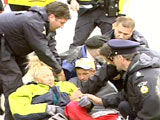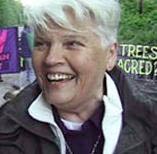
Government by injunction: an abuse of the court's process
May 26, 2006 in Opinion
“Government by injunction is a thing abhorrent to the laws of England and this province.”
Ontario Court of Appeal
“Having obtained an injunction in protection of a private right, the plaintiff seeks to turn it into a public criminal prohibition against the whole community, on the ground that there would be otherwise a flouting of the due course of justice. Can it be doubted that the proposition carries its own condemnation? It is indeed an ingenious argument for securing the aid of the criminal powers of the equity court against any persons whom the court can be induced to regard as having affronted its dignity or having interfered with the due performance of its functions.” Bora Laskin, 1937, Canadian Bar Review
“This has been a maliciously effective, pseudo-legal way of breaking the back of legitimate moral process.” Martin Luther King, Jr., 1963, commenting on the injunction that landed him in the Birminingham Jail.
“There is today the grave question of whether public order should be maintained by the granting of an injunction…” Southin J.A., 1990, Everywoman’s case, BC Court of Appeal
[This is], in essence, a request for the court to craft a proscriptive law binding on all citizens respecting certain activities. It is not the assertion of a civil claim at all, but the adaptation of the mechanics of a civil claim for the purpose of legislating, by way of injunction, a form of ad hoc criminal law…I think this proceeding amounts to a kind of officially induced abuse of process.”, McEwan J., 2003, BC Supreme Court

Why bother with laws at all, when companies and governments can employ injunctions to arrest people? Let’s identify bothersome activities and have a judge enjoin John Doe, Jane Doe and everyone else from engaging in them. Let’s then authorize the police to enforce the injunctions by arrest, then have the judges convict people of criminal contempt of court for disobeying their orders. That way we can avoid all the procedural technicalities thrown up by the Criminal Code, troublesome impediments to justice like formal charges, bail provisions, jury trials, maximum sentence lengths, etc. In fact, we don’t need a Criminal Code at all-just have the judges make a few ad hoc criminal laws by way of injunctions, with breaches punishable by contempt of court…
posted by Cameron Ward
Neil Young's "Living With War" one for the ages
May 6, 2006 in Opinion
With his latest album, “Living With War”, Neil Young has produced a masterpiece – a clarion call for action against the misguided and destructive foreign policies of the Bush administration.
I am no music critic, so I will let others critique the riffs, melodies and harmonies that Young uses to drive home his message. That message is one for the ages; a scathing, devastating and eloquent attack on President George W. Bush and his decision to invade Iraq.
As one of hundreds of thousands who futilely marched in the streets in the spring of 2003 to attempt to dissuade Bush and Blair from launching their “shock and awe” campaign, I hope that this brilliant piece of work empowers those who feel they lack the ability to influence the decisionmakers.
The album can be heard for free at www.neilyoung.com

God and Allah bless Neil Young!
posted by Cameron Ward
Taser strikes kill cow
April 16, 2006 in Opinion
Last week, a cow wandering near the Spokane Valley Mall in Washington state died after it was repeatedly Tasered by police. Last year a dog in Oregon died after repeated Taser strikes.
How do the police, coroners and other Taser advocates explain these animal deaths? It’s a pretty safe bet that neither of these animals were high on cocaine when they were zapped. I’m no animal psychologist, but I doubt whether “excited delirium” played a role either. Is it possible that, just maybe, the 50,000 volts of electricity pulsing through their bodies may have had fatal consequences?
More than 200 North Americans have died after being Tasered by police, 69 last year alone. Although there have been 14 Canadian fatalities, no independent safety tests have ever been done in this country.
posted by Cameron Ward
Cathedral Grove victory: no parking lot in paradise
April 6, 2006 in Opinion
The British Columbia government has announced that it will employ “traffic calming” in the area of Cathedral Grove, rather than bulldozing old growth forest to create a parking lot. The announcement ends a two year struggle by environmentalists and residents opposed to the government’s original plan.
We are proud to have played a small role in this important victory, having successfully opposed the BC government’s application for an injunction that would have had the effect of removing protesters from the public lands where the parking lot was to have been built.
In May of 2004, the late Madam Justice Gina Quijano dismissed the injunction application in a courageous decision that bucked conventional judicial trends.
Read Madam Justice Quijano’s 2004 decision here:
2004 BCSC 720 British Columbia (Attorney General) v. Sager et al
posted by Cameron Ward
Betty Krawczyk's appeal dismissed
March 30, 2006 in Opinion
The British Columbia Court of Appeal has dismissed Betty Krawczyk’s appeal of her conviction for criminal contempt of court arising from her 2003 protest activities. In May of 2003, Ms. Krawczyk sat on a public logging road as a symbolic demonstration of her displeasure with the government’s forestry policies and the industry’s clearcut logging practices.

“Betty K” was arrested for allegedly violating a civil injunction order obtained by Hayes Forest Services Limited and held in jail for several weeks while the Crown and the company tried to decide what, if anything, to do with her.
Ms. Krawczyk, then aged 75, spent a total of four and one half months in jail awaiting trial. Upon “conviction” she was sentenced to a further six months behind bars. Since she was never charged with a criminal offence under the Criminal Code, bail legislation did not apply.
On appeal, we argued that the process used to imprison Ms. Krawczyk for almost a year as punishment for the physical act of sitting on a public road violated her constitutional rights. The Court of Appeal disagreed. A further appeal to the Supreme Court of Canada is being considered.
Read the Court of Appeal decision here:
2006 BCCA 156 Hayes Forest Services Limited v_ Krawczyk








 Follow this site using RSS
Follow this site using RSS

